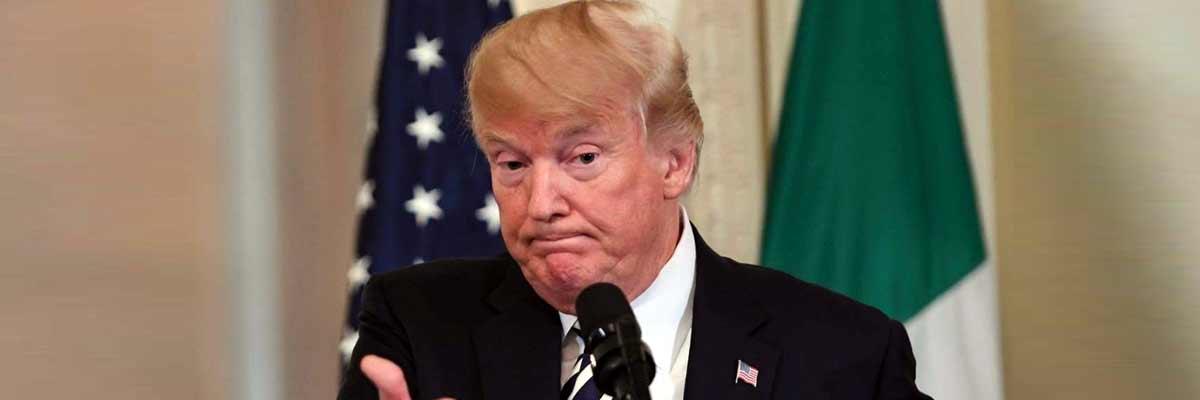Live
- National conference on digital change begins at SU
- Mathematics plays key role in different fields
- Plaint filed against FRO for obstructing MGNREGA works
- Two students drown
- Udandapur Reservoir oustees assured of fair rehabilitation package
- IPS officers’ suspension extended for six months
- Endowments officials inspect Jogulamba temple amid allegation of mismanagement
- ‘Pending bills for village panchayats must be cleared immediately: Sarpanches
- Blitzkrieg begins at PB Siddhartha
- US flays India’s 150% alcohol tariff amid trade concerns

The US President, Donald Trump\'s plan to slap stiff tariffs on imported steel and aluminium has rattled financial markets and stirred fears that some trading partners might retaliate by dumping US Treasuries.
The US President, Donald Trump's plan to slap stiff tariffs on imported steel and aluminium has rattled financial markets and stirred fears that some trading partners might retaliate by dumping US Treasuries.
Should China, Japan and other nations, which have recycled their trade dollars through their Treasuries holdings, suddenly decide to whittle them down, markets could be in for a rough ride.
Such a retaliatory move, in the wake of Trump's first big protectionist action, comes at a time when foreign demand for US debt is seen critical to offset an expected surge in federal borrowing needs, analysts and investors say. "The threats are real," said Kristina Hooper, chief global market strategist at Invesco in New York. "We need more foreign demand, not less."
To be sure, it is unlikely that Beijing, Tokyo and other overseas central banks would dump Treasuries altogether, if at all, analysts and investors said. Countries could wind up torching their own US bond investments, without winning any guaranteed gains from Washington, they said. "They already own a lot of them.
They would be shooting themselves in the foot," said Jack McIntyre, portfolio manager at Brandywine Global Investment Management in Philadelphia.
Still what US trading partners might do with their collective ownership of more than a quarter of all Treasury securities outstanding looms as a hefty risk not only for the bond market.
Treasury yields are benchmarks for total returns on stocks and other assets. Typically, when yields go up, stock prices fall.
The yields are also used by banks and other lenders to determine what they charge consumers on mortgages and other loans. US mortgage rates hit four-year highs last month.
High-pressure response
Trump's announcement of 25 per cent and 10 per cent levies on foreign steel and aluminium touched off outcries of unfair protectionism from trading partners, while it drew cheers from domestic producers as a move to combat questionable export practices by other countries. "It's a high-pressure response," said Jason Celente, senior portfolio manager at Insight Investment in New York.
Details of Trump's tariff plan are still unknown, and Celente said the tariffs might not be imposed at all after criticism from Republican lawmakers and US industries heavily dependent on steel and aluminium.
Still, Trump said "trade wars are good" on Twitter, and the rhetoric has heated up. Canada and the European Union said they are ready to take countermeasures, while China urged Trump to show restraint. "The timing of this would be poor since the Treasury needs to tap the capital markets more than ever, in greater size, to pay for the plentiful tax cuts passed a few months ago," Kevin Giddis, head of fixed income capital markets with Raymond James in Memphis, Tennessee.
The massive tax overhaul enacted last December was projected to add up to $1.5 trillion to the US debt load over a decade, while a two-year spending deal reached last month would add $300 billion to the deficit. At the end of 2017, foreign governments owned $4.03 trillion or nearly 29 per cent of the $14.47 trillion in Treasury securities outstanding.
China and Japan, two major US trading partners, are also the top two foreign holders of Treasuries with a combined holdings of $2.25 trillion in December, Treasury data showed.
In 2017, the United States rang up a $375 billion trade deficit with China and a $69 billion trade gap with Japan, according to the US Census.
Bond yields seesaw
Fears of a trade war have spooked Wall Street and caused the dollar to drop. The debt market had a seesaw response on Thursday and Friday with investors firstly buying US Treasuries as a safe haven and sending the benchmark 10-year note's yield to a three-week low.
They reversed those bond positions on Friday, mostly due to worries that the Bank of Japan might exit its ultra-loose monetary policy. Investors also sold to make room for next week's heavy corporate debt supply. However, growing anxiety among traders about foreign retaliation through selling or buying fewer Treasuries may be coming into play, some investors and analysts said. "You can't rule it out. It's unsettling the market a bit," McIntyre said.
By: Richard Leong

© 2025 Hyderabad Media House Limited/The Hans India. All rights reserved. Powered by hocalwire.com







